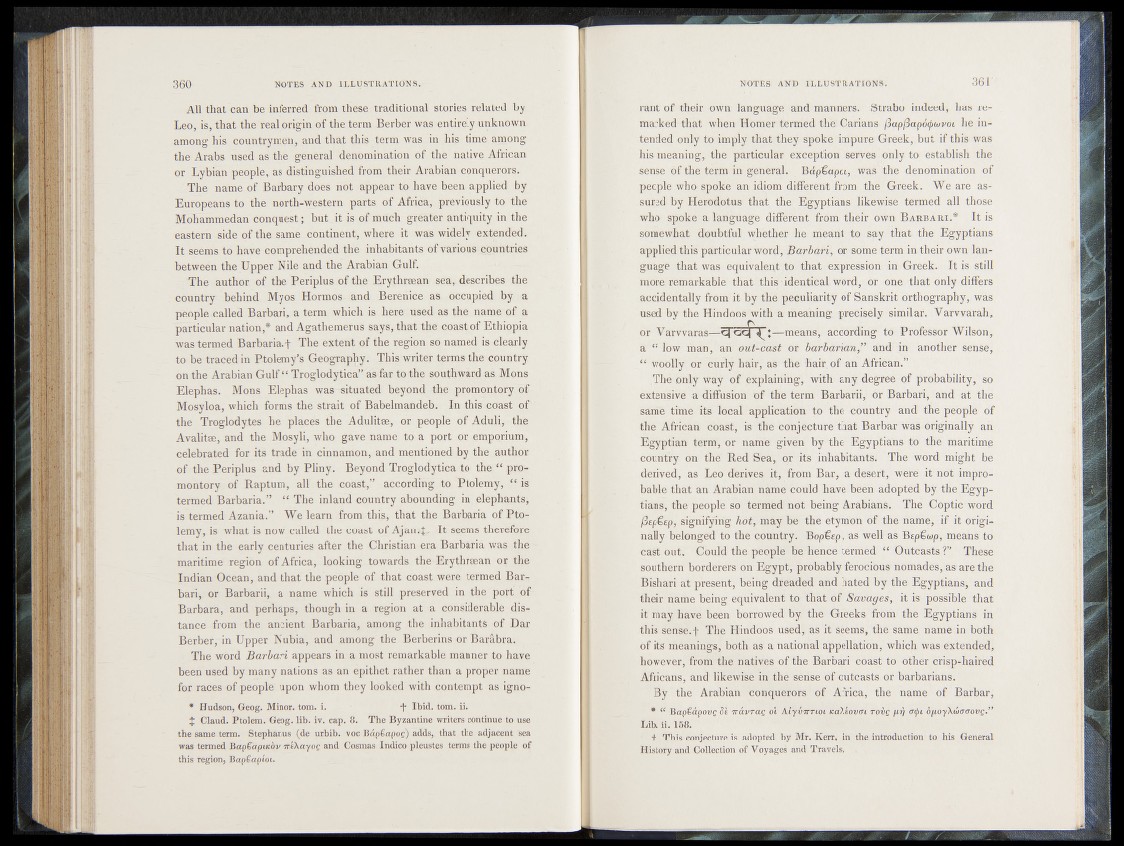
All that can be inferred from these traditional stories related by
Leo, is, that the real,origin of the term-Berber was entirely unknown
among his countrymen, and that this term was im his time among
the Arabs used as the général dénomination of the‘ native African
or Lybian people, as distinguished from their Arabian conquerors.
The name of Barbary does not appear to have been applied by
Europeans to the north-western parts of Africa, previously to the
Mohammedan conquest ; but it is of much greater antiquity in the
eastern side of the same continent, where it was widely extended.
It seems to have comprehended the inhabitants of various çountries
between the Upper Nile and the Arabian Gulf.
The author of the Periplus of the Erythraean sea, describes the
country behind Myos Hormos and Berenice as occupied by a
people called Barbari, a term which is here used as the name of a
'particular nation,* and Agathemerus says, that the coast of Ethiopia
was termed Barbaria.f The extent of the region so named is clearly
to be traced in Ptolemy’s Geography. This writer terms the country
on the Arabian Gulf “ Troglodytiea” as far to the southward as Mons
Elephas. Mobs Elephas was situated beyond the promontory of
Mosyloa, which forms the strait of Babelmandeb. In this cdast of'
the Troglodytes he places the Adulitæ, or people of Aduli, the
Avaiitæ, and the Mosyli, who gave name to' a port or emporium,
celebrated for its trade in cinnamon, and mentioned by the author
of the Periplus and by Pliny. Beyond Troglodytiea to the “ promontory
of Ilaptum, all the coast,” according to Ptolemy, “ is
termed Barbaria.” “ The inland country abounding in elephants,
is termed Azania.” We learn from this, that the Barbaria of Ptolemy,
is what is now called the coast of Ajanj^, It seems therefore
that in the early centuries after .the Christian era Barbaria was the
maritime region of Africa, looking-towards the Erythraean or the
Indian Ocean, and that the people of that coast were termed Barbari,
or Barbarii, a name which is still preserved in the port of
Barbara, and perhaps, though in a region at a considerable distance
from the ancient Barbaria, among the inhabitants of Dar
Berber,“in Upper Nubia, and among the Berberins or Barâbra.
The Word Barbari appears in a most remarkable manner to have
been used by many nations as an epithet rather than a proper name
for races of people upon whom they looked with contempt as igno-
* Hudson, Geog. Minor, tom. i. Ibid. tom. ii.
+ Claud. Ptolem. Geog. lib. iv. cap. 8. The Byzantine writers continue to use
the same term. Stephànus (de urbib. toe Bap€apog) adds, that the adjacent sea
was termed BapGaptubv wi\ayog and Cosmas Indico pleustes terms the people of
this region, Bap£apioi.
rant of their own language and manners. .Strabo indeed, has remarked
that when Homer termed the' Garians (iap^apócjxuvoi he intended
only to imply that they spoke impure Greek, but if this was
his meaning, the particular exception serves only to establish the
sense óf'the term in general. Bdp€apoi, Wasthe denomination of
people wljo; spoke an idiom different from the Greek. We are assured
by Herodotus that the Egyptians likewise termed all those
who spoke a language different from Merr ^own Barbari.* It is
somewhat doubtful whether he meant|#>. say that the Egyptians
applied this particular word, Barbari', or some term in their own language
that was equivalent to that expression in Greek. It is still
more remarkable that'this‘identical, worp, or one that only differs
accidentally from it by the peculiarity of Sanskrit orthography, was
used by the Hindoos with a meaning precisely similar. Varvvarah,
or Varvvaras—<5J Qq * j—mMns, accordh^'t© Profdsor Wilson*
a u low man, an out-cast or barbarian” and iu another sense,)
H woolly- or curly hair, as the bair.of an African.”/'!;.'
,Thé only way o f explaining, with any degree of probability, so
extensive a diffusion of the term Barbarii, or Barbari, and at the
same time its local application terthe country and the peöplé of
the African coast, is the conjecture that Barbar was originally an
Egyptian term, or name given by the Egyptians to the maritime
country on the Red Sea, o,r its inhabitants. The word might be
derived, as Leo derives it, from Bar, a desert, were it not improbable
that an Arabian name could have been adopted by the Egyptians,
the people so termed not being Arabians. The Coptic-word
fieptep, signifying Ao#, may be the etymon of the name, if it originally
belonged to the country. Bop€ep, as well as Bep&op, means to
cast out." Cbuldthe people be hence termed “ Outcasts?” These
southern borderers on Egypt, probably ferocious nomades, as are the
Bishari at present, being dreaded and hated by the; Egyptians, and
their name being equivalent to that of Savages, it is possible that
it may have been borrowed by the Greeks from the Egyptians in
this sense.f The Hindoos used, as it seems, the same name in both
of its meanings, both as a national appellation, which was extended,
however, from the natives of the Barbari coast to other crisp-haired
Africans, and likewise in the sense of oütcasts or barbarians.
By the Arabian conquerors of Africa, the name of Barbar,
* u Baptàpovç ôè irâvraç oi Aiyvirrioi Ka\kov<n rçii.ç pr) <r<pi opoyXûaffovç.”
Lib. ii. 158.
i + This conjecture is adopted by Mr. Kerr, in the introduction to his General
History and Collection of Voyages and Travels. .
aHHPSMilHi